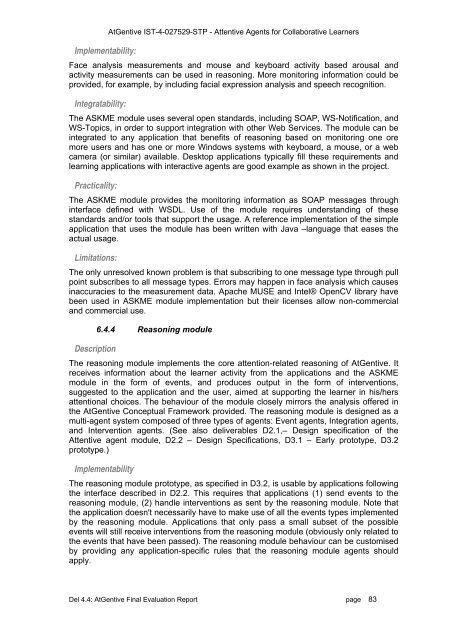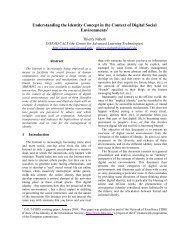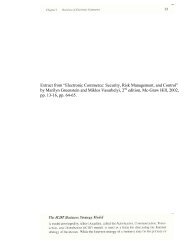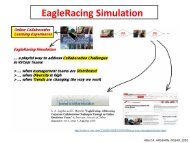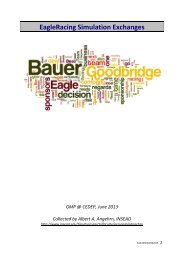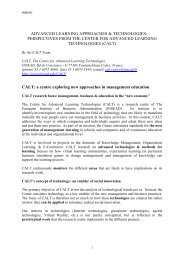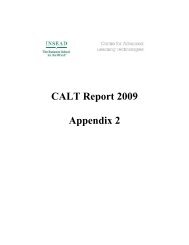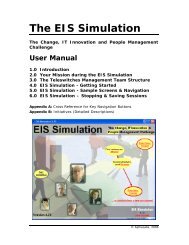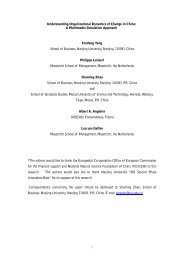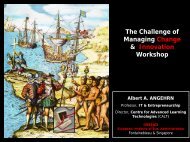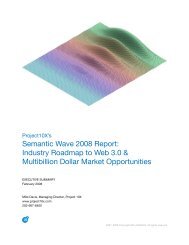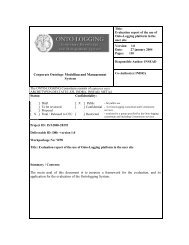Deliverable 4.4 - INSEAD CALT
Deliverable 4.4 - INSEAD CALT
Deliverable 4.4 - INSEAD CALT
Create successful ePaper yourself
Turn your PDF publications into a flip-book with our unique Google optimized e-Paper software.
Implementability:AtGentive IST-4-027529-STP - Attentive Agents for Collaborative LearnersFace analysis measurements and mouse and keyboard activity based arousal andactivity measurements can be used in reasoning. More monitoring information could beprovided, for example, by including facial expression analysis and speech recognition.Integratability:The ASKME module uses several open standards, including SOAP, WS-Notification, andWS-Topics, in order to support integration with other Web Services. The module can beintegrated to any application that benefits of reasoning based on monitoring one oremore users and has one or more Windows systems with keyboard, a mouse, or a webcamera (or similar) available. Desktop applications typically fill these requirements andlearning applications with interactive agents are good example as shown in the project.Practicality:The ASKME module provides the monitoring information as SOAP messages throughinterface defined with WSDL. Use of the module requires understanding of thesestandards and/or tools that support the usage. A reference implementation of the simpleapplication that uses the module has been written with Java –language that eases theactual usage.Limitations:The only unresolved known problem is that subscribing to one message type through pullpoint subscribes to all message types. Errors may happen in face analysis which causesinaccuracies to the measurement data. Apache MUSE and Intel® OpenCV library havebeen used in ASKME module implementation but their licenses allow non-commercialand commercial use.Description6.<strong>4.4</strong> Reasoning moduleThe reasoning module implements the core attention-related reasoning of AtGentive. Itreceives information about the learner activity from the applications and the ASKMEmodule in the form of events, and produces output in the form of interventions,suggested to the application and the user, aimed at supporting the learner in his/hersattentional choices. The behaviour of the module closely mirrors the analysis offered inthe AtGentive Conceptual Framework provided. The reasoning module is designed as amulti-agent system composed of three types of agents: Event agents, Integration agents,and Intervention agents. (See also deliverables D2.1,– Design specification of theAttentive agent module, D2.2 – Design Specifications, D3.1 – Early prototype, D3.2prototype.)ImplementabilityThe reasoning module prototype, as specified in D3.2, is usable by applications followingthe interface described in D2.2. This requires that applications (1) send events to thereasoning module, (2) handle interventions as sent by the reasoning module. Note thatthe application doesn't necessarily have to make use of all the events types implementedby the reasoning module. Applications that only pass a small subset of the possibleevents will still receive interventions from the reasoning module (obviously only related tothe events that have been passed). The reasoning module behaviour can be customisedby providing any application-specific rules that the reasoning module agents shouldapply.Del <strong>4.4</strong>: AtGentive Final Evaluation Report page 83


